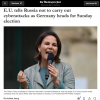DIY-HP-LED
Well-Known Member
Obama says 'certain right-wing media' outlets are 'stoking the fear and resentment' of white Americans (yahoo.com)
Obama says 'certain right-wing media' outlets are 'stoking the fear and resentment' of white Americans
Progress has been made, former President Barack Obama told CNN's Anderson Cooper, but he finds it's still hard for the "majority" of white Americans to "recognize you can be proud of this country and its traditions and its history and our forefathers, and yet it is also true that this terrible stuff happened. The vestiges of that linger and continue."
Obama told Cooper, in an interview broadcast Monday night, that during his time in office, when he "tried to tell that story, oftentimes my political opponents would deliberately not only block out that story but try to exploit it for their own political gain."
In 2009, Obama commented on Massachusetts police officers detaining Harvard Prof. Henry Louis Gates, who is Black, while he was trying to enter his own home, saying Cambridge police "acted stupidly in arresting somebody when there was already proof that they were in their own home." Obama told Cooper his poll numbers dropped with white voters after he made these remarks, and that "gives a sense of the degree to which these things are still ... they're deep in us. And, you know, sometimes unconscious."
There are also "certain right-wing media venues, for example, that monetize and capitalize on stoking the fear and resentment of a white population that is witnessing a change in America," Obama said. The nationalization of media and politics is making it so Americans are occupying "different worlds," he told Cooper, and when people are this divided, it "becomes that much more difficult for us to hear each other, see each other. We have more economic stratification and segregation. You combine that with racial stratification and the siloing of the media, so you don't have just Walter Cronkite delivering the news, but you have 1,000 different venues. All that has contributed to that sense that we don't have anything in common."
To try to bridge the divide, Obama said, Americans need to be able to see each other in person, to hold face-to-face conversations. "The question now becomes, how do we create those venues, those meeting places for people to do that?" he continued. "Because right now, we don't have them and we're seeing the consequences of that."
Obama says 'certain right-wing media' outlets are 'stoking the fear and resentment' of white Americans
Progress has been made, former President Barack Obama told CNN's Anderson Cooper, but he finds it's still hard for the "majority" of white Americans to "recognize you can be proud of this country and its traditions and its history and our forefathers, and yet it is also true that this terrible stuff happened. The vestiges of that linger and continue."
Obama told Cooper, in an interview broadcast Monday night, that during his time in office, when he "tried to tell that story, oftentimes my political opponents would deliberately not only block out that story but try to exploit it for their own political gain."
In 2009, Obama commented on Massachusetts police officers detaining Harvard Prof. Henry Louis Gates, who is Black, while he was trying to enter his own home, saying Cambridge police "acted stupidly in arresting somebody when there was already proof that they were in their own home." Obama told Cooper his poll numbers dropped with white voters after he made these remarks, and that "gives a sense of the degree to which these things are still ... they're deep in us. And, you know, sometimes unconscious."
There are also "certain right-wing media venues, for example, that monetize and capitalize on stoking the fear and resentment of a white population that is witnessing a change in America," Obama said. The nationalization of media and politics is making it so Americans are occupying "different worlds," he told Cooper, and when people are this divided, it "becomes that much more difficult for us to hear each other, see each other. We have more economic stratification and segregation. You combine that with racial stratification and the siloing of the media, so you don't have just Walter Cronkite delivering the news, but you have 1,000 different venues. All that has contributed to that sense that we don't have anything in common."
To try to bridge the divide, Obama said, Americans need to be able to see each other in person, to hold face-to-face conversations. "The question now becomes, how do we create those venues, those meeting places for people to do that?" he continued. "Because right now, we don't have them and we're seeing the consequences of that."













